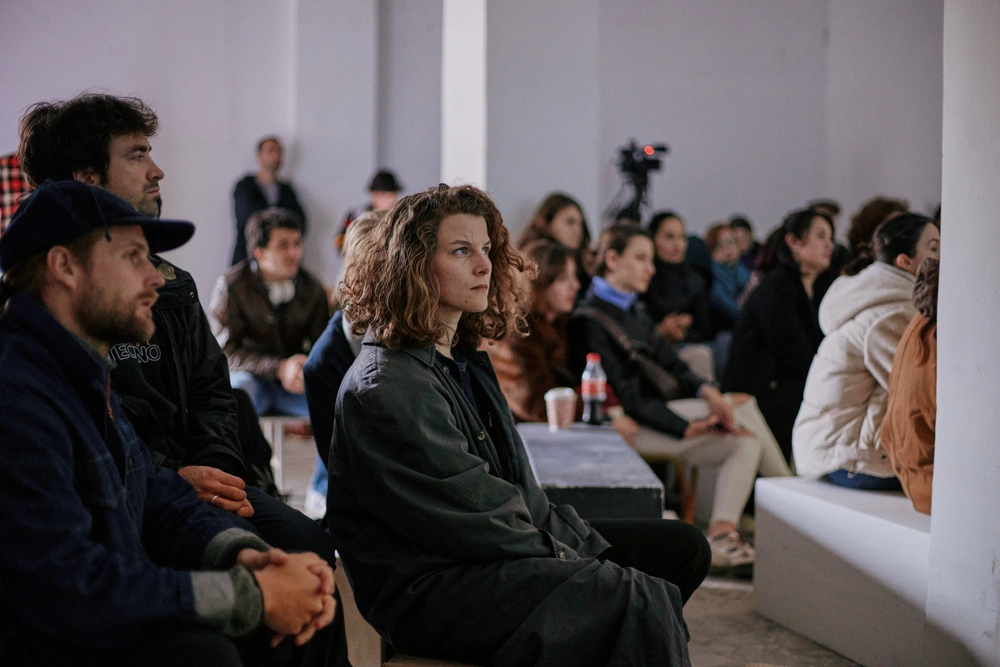Current. Currencies - LINA round table discussion

“Current. Currencies” panel talk and discussion session occurred on April 2, 2023, as four research-based lectures by LINA fellows and Georgian professionals. Moderated by Tinatin Gurgenidze, one of the founders of TAB, “Current. Currencies” („დინება. ბრუნვა“) was thematically tied to the TAB work for the Georgian Pavilion at the 18th Architecture Biennale in Venice: water, rivers and the politics of their consumption: natural environment as space and its development-planning solutions. The hosting space was The Center of Contemporary Art – an independent hub of informal education and practice by artists and activists. Aleksandra Aroshvili - an independent researcher on post-Soviet transformations and ecology issues, presented her “Extractivist Operations of Appropriating Hydro-resources: Attacking Life” The presentation discussed how water is becoming a "resource curse" for Georgia and what it means when modern technological and economic systems attack life.
Collaboration with LINA fellows
Aleksandra Aroshvili - an independent researcher on post-Soviet transformations and ecology issues, presented her “Extractivist Operations of Appropriating Hydro-resources: Attacking Life” The presentation discussed how water is becoming a "resource curse" for Georgia and what it means when modern technological and economic systems attack life.
LINA fellow from the Netherlands, “Studio Inscape”, which focuses on design experiences through human-non-human interactions and their ecologies, discussed the water management of Dutch lowlands.
*Studio Inscape was founded by Charlotte von Meijenveldt, Willie Vogel and Eileen Stornebrink in 2018 prior to graduating from the Delft University of Technology in 2020. The duo is experienced in designing spatial strategies, installations and experiences that focus on human-non-human interactions. Trained as architects and urbanists, they aim to translate eco-philosophical theory to practice within the built environment. In doing so, they enjoy working collectively.
The recycle-dedicated project RRRuble by Space Saloon and The MAAK (Italy) opened the talk with a short performance and trans-media work, including field research in Tbilisi about waters and urban space while through their past projects, analysed water as a catalyst of spatial discourse.
*Space Saloon is a collective of architects, artists and researchers, led by Danny Wills, Gian Maria Socci and Rebecca van Beeck. Their projects build communities, promote learning and foster engagement through the production of transdisciplinary forms of knowledge. The MAAK is a spatial practice based in Cape Town, South Africa. The studio’s outputs range from full-scale public buildings to experimental spatial enquiries. The MAAK was co-founded by Ashleigh Killa and Max Melvill in 2016.
Finally, Aleksi Soselia- curator and art manager from Tbilisi, told the audience about „River’s Magic Garden“, an annual resistance exhibition to reclaim the Mtkvari river meadows through creative space planning.
The audience was highly engaged – with an event duration lasting several hours longer than we had expected due to many questions and exchanges of thoughts. The audience comprised artists of all backgrounds and experience, political activists, architecture students, filmmakers, curators, researchers, eco-activists, and educators. Presenters and audience continued with an informal meeting accompanied by drinks and food – where additional discussion and exchange of information took place. Overall, the interactions mainly focused on problems of sustainability, spatial activism, and official environmental politics of Georgia, possible solutions or the new know-how that could be developed in specificities of post-soviet contexts.Many spatial experiences and meet-ups followed as a result of this event:
- LINA fellows took an excursion at the Dighomi Meadows and met activist and biophysicist Anna Trapaidze – a leader of a neighbourhood Initiative that has been working to save, restore and protect the landscape and biodiversity of the unique riparian forest of Tbilisi, which has been destroyed by large-scale illegal waste dumping and resource extraction since 2020.
- The fellows, other biennial friends and enthusiasts explored the unique eco-system of “Eliava Market” – a large, incidentally developed market of building materials, blacksmiths, carpenters, painters, and craftspeople on the left bank of the city.
Photo: Giorgi Kolbaia
Related fellows


Related projects

